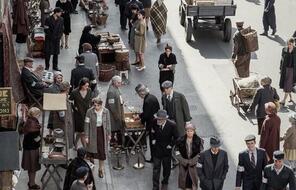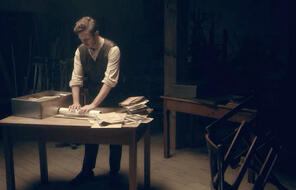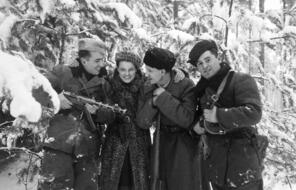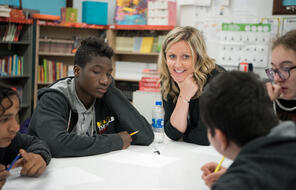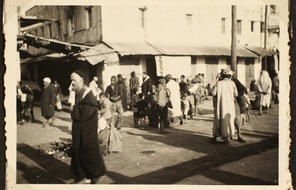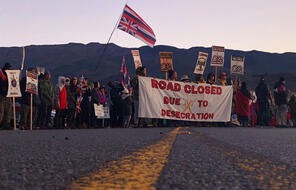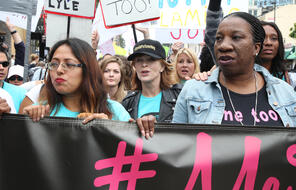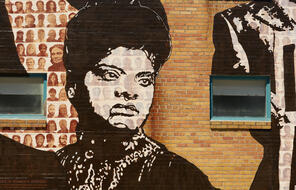Sonia Orbuch’s Biography
At a Glance
Language
English — USSubject
- History
- The Holocaust
- Resistance
Sonia Orbuch, born Sarah Shainwald, grew up in Luboml, a small market town with a thriving Jewish population 200 miles from Warsaw, Poland. She was 14 years old when war first interrupted her childhood in 1939—the Molotov-Ribbentrop Pact that divided Poland between Germany and the Soviet Union placed Luboml under Soviet control. Two years later, Germany, in violation of its agreement with Soviet Union, launched Operation Barbarossa, and once again Sonia’s life was disrupted—this time by the Nazis, who forced the 8,000 Jews of the town into a ghetto.
News spread quickly when the Germans began killing the Jews in the ghetto. In desperation, the Shainwalds and other families built hiding places in their homes. In Sonia’s house, they built a double wall the width of a sofa. Someone would keep watch at the window. If the trucks came rumbling into town, everyone knew there would be a roundup, and the family would hide.
Sonia's brother and several friends escaped to join a partisan group, but his group only accepted young men, so the forest was the only hope for Sonia and her parents. The winter of 1942 to 1943 was one of the most bitter on record. Sonia and her family—cold, hungry, dirty, but alive—huddled in the forests. Sonia’s Uncle Tzvi, a trained scout who knew his way around the woods, was with them. They never stayed in one place for too long because they didn’t want to get caught.
Sometime during that winter, a peasant, Tichon, came upon them when he was out chopping wood. He cried with compassion when he saw young Sonia and vowed to help them in whatever way he could. Tichon gave them potatoes that saved their lives, and when the Ukrainians sent scouts to hunt the Jews, he advised them to go deeper into the forest.
Eventually, the family found shelter in a barn that belonged to a destitute widow with many children and stayed there for six weeks. Then Tichon came and told them that partisans were living in the woods nearby. Tichon arranged a meeting with the Soviet partisan commander, who saw before him four skeletons who seemed of little use to him because they had no weapons.
Sonia says, “We couldn’t walk, and were living on one potato a day; we were dirty and full of lice.” The Soviets badly needed Tzvi's knowledge of the area because they were unfamiliar with the territory. So the family was accepted. Sonia says, “We came into the partisan camp looking like wild animals, [with] dirty, long, filthy hair and starving.” The family was amazed to find an entire functioning society hidden in the forest. People were cooking, doing laundry, and baking bread.
To join the group, Sonia, who was still known as Sarah, was asked to register. She recalls, “Registration was simple: In the open air, a man holding a notebook briefly queried each of us and recorded our responses. When I gave my name as Sarah, he shook his head in disapproval. ‘Here, there are no Sarahs,’ he stated. ‘You will be called Sonia,’ and he wrote that down. I couldn’t object and wasn’t even sure I wanted to. I already felt like a changed person, and the new Russian name fit my new life . . .”
WIth a new name, Sonia began her life in the forest encampment that served as a base for missions of sabotage and resistance. Early on, Sonia was assigned to guard duty and providing first aid on missions to mine enemy train tracks. With little training, Sonia learned the skills of a field-hospital aide, treating the wounds of injured partisans using whatever makeshift supplies were available. To avoid possible torture and interrogation in the event of capture, Sonia carried two hand grenades: “One for the enemy, and one for myself.”
In the spring of 1944, Sonia’s battalion was drafted into the Red Army. As the group prepared to move out, the Jewish commander who had sexually harassed her when they first arrived in the partisan camp pulled Sonia’s family aside. He gave them a horse and wagon and told them to leave immediately and even escorted them to a village. There he entrusted a local family with their care and warned that if he returned and didn’t find Sonia’s family alive and well, he would kill them.
They were safe for the moment, but soon they heard a rumor about Germans coming, so Sonia’s family ran to a deserted village. The family hid in an empty house, where Sonia’s mother caught typhus and died. Eventually the family made it back home to Luboml. Sonia was working in the Luboml post office when the war ended in May 1945. Her father was appointed director of a government-run company that dealt in animal skins. Though they were back home, nothing was the same, and Sonia focused her energies on emigrating to America.
In the nearby town of Chelm, she met her future husband, Isaak Orbuch, who served in the Polish and Soviet armies and had lost his entire family. Then they went to Lodz and from there to a displaced person’s camp in Zeilsheim near Frankfurt, Germany. These were refugee camps where Jews and others stayed until they could be resettled. Sonia and Isaak’s daughter Bella was born in the camp. “I was eager to have children as soon as possible. I felt it was a statement of defiance to show that the Jewish nation lives on,” she says. In February 1949, the family emigrated to the United States and settled in New York, where they had a son named Paul. 1
- 1Adapted from “Sonia Orbuch: A Young Woman with the Soviet Partisans” Study Guide at Jewish Partisan Educational Foundation.
How to Cite This Reading
Facing History & Ourselves, "Sonia Orbuch’s Biography," last updated May 12, 2020.
This reading contains text not authored by Facing History & Ourselves. See footnotes for source information.

